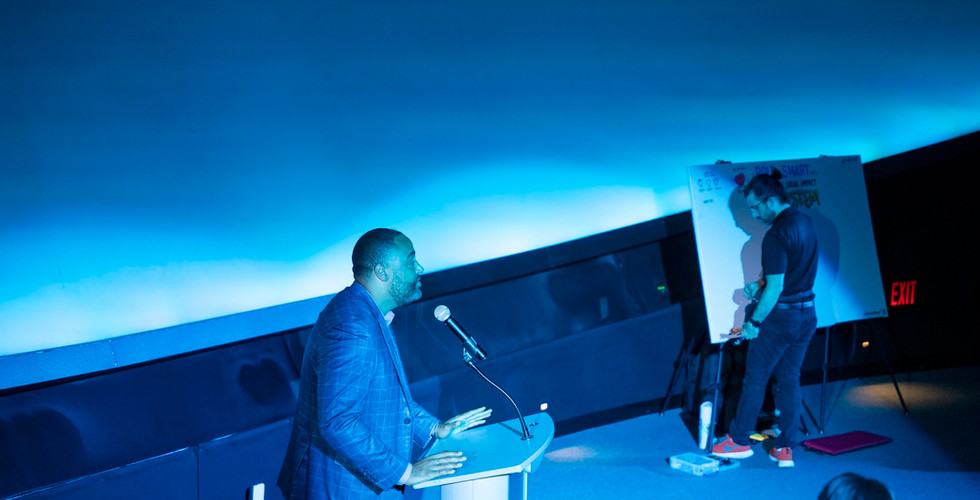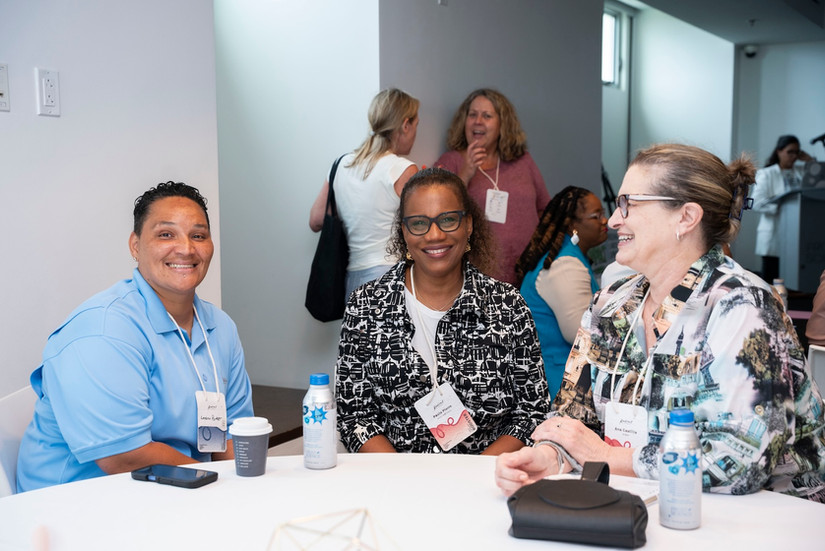RADICAL RESPONSE TO A RADICAL NEW REALITY
- Yulia Strokova

- Aug 4
- 6 min read
Updated: Sep 9
What if Miami’s social impact ecosystem could thrive on shared resources, tech integration, and a bold shift from charity to a for-impact mindset? Radical Partners is offering a blueprint — and all capacity seekers, boosters, and builders are responding.
Photos Courtesy of Radical Partners
“It’s time to stop calling ourselves ‘nonprofits’ and start embracing the idea of for-impact ventures. This isn’t charity. It’s critical, professional work — not just our passion — and we must treat it, and resource it, as such.”
With that call — bold, smart and kind as she is — Joan Marie Godoy, CEO of Radical Partners, didn’t just open the Neighborhood Heroes Connect conference; she raised the stakes. Her message was clear yet urgent: it’s time to reimagine a system that too often burns out its leaders and leaves local heroes scrambling to survive.
On June 5, 2025, more than 80 changemakers were invited to the Phillip & Patricia Frost Museum of Science to discuss this reality head-on. The goal: expose deep gaps in resources and spark a new vision for Miami’s social impact sector, one that moves beyond scarcity and siloed efforts into a thriving, interconnected ecosystem.
In the room were not only nonprofit leaders but also representatives from JPMorgan Chase, TD Bank, and other corporate players, signaling a growing recognition that private-sector engagement is no longer optional but essential.
For more than a decade, Radical Partners has been at the forefront of this work — connecting the dots and shifting power. As a social impact accelerator, the organization has equipped South Florida changemakers with the tools, networks, and funding to grow ventures and strengthen communities. Through initiatives like Leadership Lab and one-on-one mentoring, they’ve helped leaders dream bigger and build stronger. But as Joan reminded the room, today’s challenges demand more than incremental progress.
“We’re not just running organizations. We’re building communities together,” she said. “To sustain that, we need a radical systemic shift — not just in how we work but in how we think.”
From Silos to Ecosystems
This vision struck a deep chord with nonprofit leaders already feeling the cracks in the system.
Sandra Bermudez, CEO of The Lucy Project, who has spent years confronting the literacy gap, spoke candidly about the toll:
“If I hear one more person tell me, You just need to teach your kids how to read. Yes, I know — that’s what I do all day long. But how do you expect us to do it sustainably? Funders almost never want to support capacity building. That means I work 14-hour days. So does my operations director. So does everyone on our team. We’re exhausted.”

Sandra Bermudez, The Lucy Project
The system can’t simply be patched — it needs a reset. That shift is at the heart of a bold new framework Radical Partners unveiled, one informed by months of research and conversations with alumni, Neighborhood Heroes and Social Innovators, graduated from Leadership Lab and Social Entrepreneurship Bootcamp cohorts, and other local leaders. The findings revealed a sector overflowing with passion but constrained by fragmented systems, duplicated efforts, and limited resources.
Radical Partners challenged attendees to see themselves not as isolated actors but as interdependent parts of a larger whole.
They outlined three key roles within this ecosystem: Boosters (funders and capacity-building supporters), Capacity Seekers (Neighborhood Heroes and Social Innovators), and Builders (consultants, conveners and coaches strengthening organizations from within).
The challenge to the room was clear: What would it take to stop competing for crumbs and start building collective capacity?

Sandra LaFleur, director of changemaking education and social innovation at Miami Dade College, shared the urgency:
“This is the moment when we’re going to be most tested. Things are tightening, and the ‘containers’ we operate in are shrinking. The critical conversation must be with the boosters. Too often, money is distributed without ensuring it’s used effectively, and that hurts all of us.”
A Roadmap to Strengthen South Florida’s Social Impact Ecosystem
Shared Resources, Services, and Spaces…
Radical Partners’ framework rejects the idea of “us and them.” Instead, it’s built on four interconnected strategies that recognize every player — funders, organizations, capacity builders, private sector, and communities — has a role to play.
It begins with a simple shift: start with the resources you already have and ask what you can offer to strengthen the whole.
Capacity building is a conversation that too often slips through the cracks. While leaders hustle to run programs, manage teams, fundraise, and keep operations afloat, there’s a deeper question that rarely gets the attention it deserves:
What if they had the shared resources and spaces to lead sustainably?
“If you’re a funder, partner with someone else: pool your dollars or put out an RFP for us to apply to,” Joan said. “If you’re trying to hire an accountant, a social media person, a lawyer — why not join forces with your peers and share the cost? Even with space: if rent is a challenge, can we share a room? This isn’t just a nice thing to do anymore. It’s a smart thing to do, so we’re stronger and better together.”
Mapi Garcia, founder of Joy for Impact, reinforced the point:
“The truth is, nonprofit leaders are wearing a million hats. Funders need to take a closer, more intentional look at how to support organizations’ capacity — not just in theory, but in practice. So leaders can continue bringing the passion and energy that drives their work while having the infrastructure and support to deliver it in an organized, strategic, and impactful way.”
AI for Good: Work Smart
For too long, advanced technology has been viewed as the domain of corporations and tech startups, out of reach for the social sector. But what if nonprofits and community organizations could harness the same tools to amplify their impact?
“Whether we admit it or not, technology is already embedded in everything we do,” Joan noted. “So let’s stop resisting it and start leveraging it. Imagine a shared tech infrastructure that serves us all: a single place to post community events, find vetted service providers, or access centralized resources.”
She painted a vivid picture:
“Say I’m a parent looking for something to do with my kids — boom, 15 events in one place. Or if I need an accountant who understands 501(c)(3)s, instead of scrolling through WhatsApp chats from Social Entrepreneurship Bootcamp, I could trust a platform built for us. Does this exist yet? No. Have we tried before? Yes. Did it fail? Yes. So let’s ask why — and make it work this time.”
Collective Impact Models
Joan acknowledged true collaboration isn’t easy. It’s slow, messy, and often expensive. But she argued it’s essential.
“The common agenda is worth the alignment work,” she said, pointing to successful examples in Miami like Arts Access Miami, bringing the power of music and the arts to all youth in Miami-Dade county.
And there’s artlook® Miami, a county-wide map that not only visualizes the arts education landscape but also connects schools and organizations, strengthening the ecosystem for youth arts access.
“It’s been eight years since we incubated that initiative and they’re now doing it right in Miami Gardens and Homestead,” Joan continued. “When twelve organizations align around ensuring youth have access to music, it’s complex, but the outcomes are exponentially more powerful than working in silos.”
A Cultural Shift: From Charity to For-Impact
When we frame social impact as essential rather than optional, we open the door for deeper collaboration across sectors. Funders become co-investors. Private companies become allies. And the people doing this work — the heroes and builders — are seen not as passion-driven volunteers but as professionals driving real, lasting transformation.
Social impact isn’t a handout or an afterthought. It’s an economic engine. It’s time we started treating it that way.
Together in 2024, Neighborhood Heroes and Social Innovators — the changemakers Radical Partners surveyed — operated with a combined budget of $29.4 million. Collectively, they employ over 240 people in South Florida, proving that mission-driven organizations aren’t just delivering services — they’re creating jobs, driving social and climate impact innovation, fueling local economies, and delivering measurable value to communities.
As Joan put it: “When we reclaim our power and change the story, no one can take it from us.”
We hope you appreciated this paywall-free article. As an independent community-driven media, Impact.Edition elevates the voices of local changemakers who work toward positive lasting change – from addressing social inequality to saving the planet from environmental ruin. We would be grateful if you would consider a small donation to support our volunteering editorial efforts and shared mission to empower people with best practices and creative solutions for a more just, more sustainable world.










































































Comments